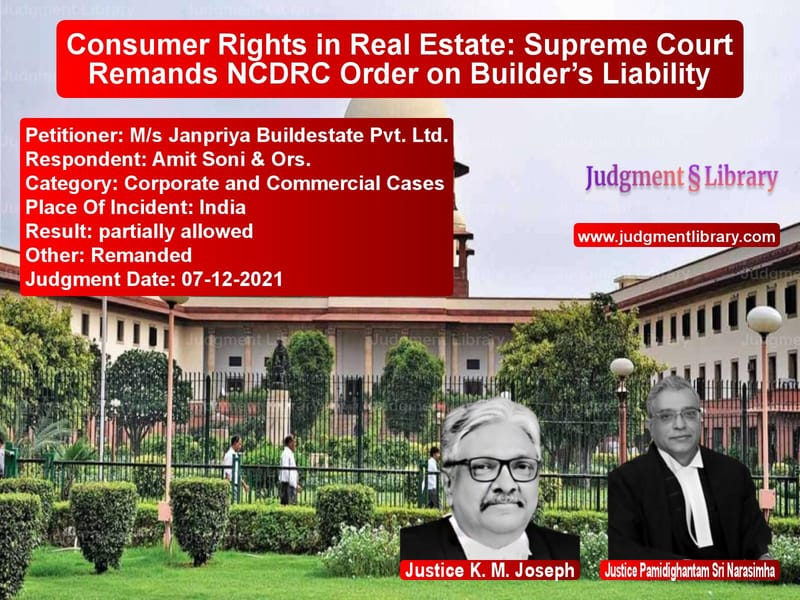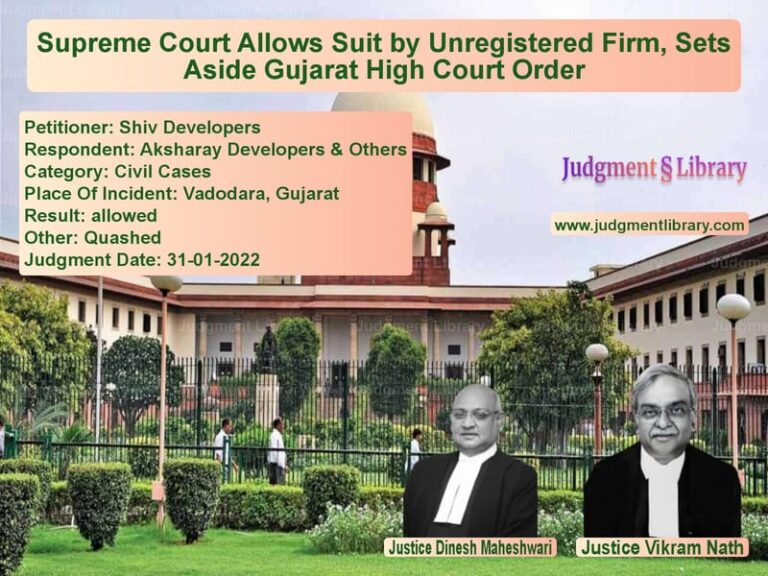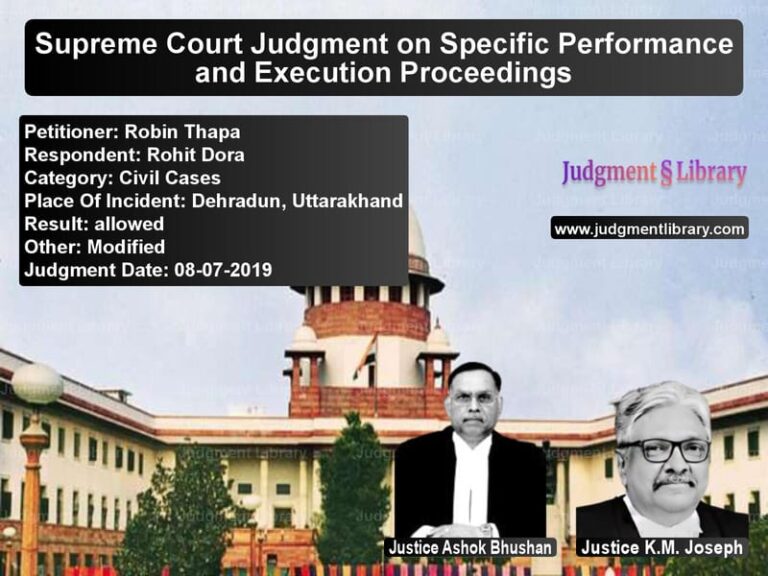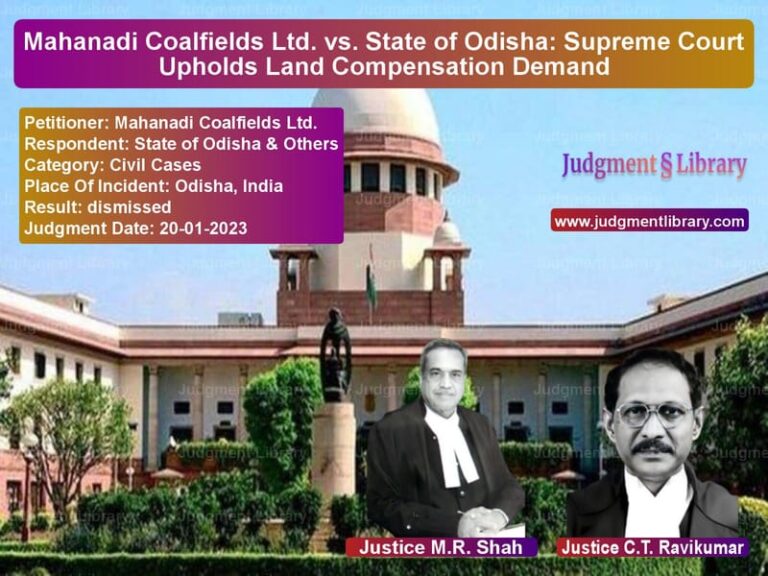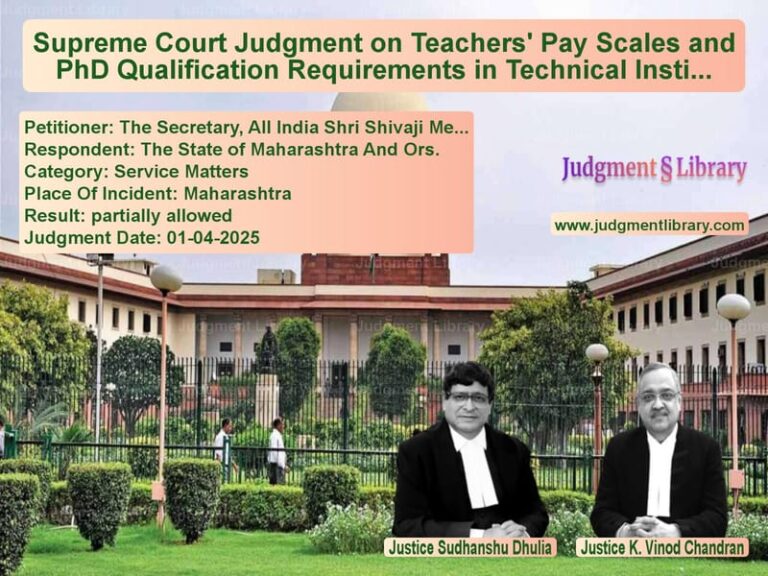Consumer Rights in Real Estate: Supreme Court Remands NCDRC Order on Builder’s Liability
The Supreme Court of India recently delivered a critical judgment in a real estate dispute, emphasizing the need for fair contractual obligations in consumer transactions. The case involved homebuyers who had booked flats in a housing project developed by Umang Realtech Private Limited, with M/s Janpriya Buildestate Pvt. Ltd. (the landowner) being a party to the agreement. The National Consumer Disputes Redressal Commission (NCDRC) had held both the developer and landowner liable for refunding the buyers’ money. However, the Supreme Court set aside the NCDRC’s order, remanding the case back while allowing the buyers an opportunity to amend their pleadings.
Background of the Case
The dispute arose when homebuyers, including Amit Soni and others, booked flats in a project initiated by Umang Realtech Pvt. Ltd. The land on which the project was being developed was owned by M/s Janpriya Buildestate Pvt. Ltd. A collaboration agreement was signed between the landowner and the developer, defining their respective responsibilities. The homebuyers signed a tripartite agreement with both the builder and landowner.
However, the project faced delays, and homebuyers did not receive possession of their flats within the promised timeframe. Frustrated by the inordinate delay, the buyers filed complaints with the NCDRC under the Consumer Protection Act, 1986, seeking refunds along with interest.
The NCDRC ruled that both the builder and the landowner were jointly and severally liable to refund the buyers’ payments with interest. The landowner, Janpriya Buildestate Pvt. Ltd., challenged this ruling before the Supreme Court, arguing that it had no direct contractual obligations toward the homebuyers apart from providing land for the project.
Arguments Presented by the Appellant (Landowner)
M/s Janpriya Buildestate Pvt. Ltd., represented by its legal counsel, presented the following arguments:
- The company was merely a landowner and had no direct contractual obligations with the buyers apart from ensuring clear title to the land.
- Under the collaboration agreement, the builder was solely responsible for project execution, approvals, marketing, and customer dealings.
- The tripartite agreement was entered into only to facilitate the transfer of ownership rights upon completion of the project.
- The NCDRC erred in treating the landowner as a co-developer without examining the actual terms of the agreements.
Arguments Presented by the Respondents (Homebuyers)
The homebuyers, represented by their legal counsel, made the following counter-arguments:
- The landowner was a signatory to the tripartite agreement and had full knowledge of the project’s execution.
- As a confirming party, the landowner played an essential role in the project, making it equally liable for the delay and refund obligations.
- The collaboration agreement included revenue-sharing clauses between the landowner and developer, indicating active financial participation.
- The developer had entered insolvency proceedings, making it imperative for the landowner to be held liable to protect the interests of homebuyers.
Supreme Court’s Observations and Ruling
The Supreme Court analyzed the collaboration agreement and the tripartite agreement in detail. It made the following observations:
- The landowner’s role in the project was primarily limited to providing land and receiving financial consideration from the developer.
- The tripartite agreement defined the landowner as a “confirming party,” meaning it was not the primary entity responsible for construction and delivery of flats.
- The NCDRC failed to undertake a proper legal examination of the landowner’s obligations before holding it jointly liable.
- The case merited a re-examination, as the buyers did not plead specific allegations against the landowner regarding its liability in case of project failure.
The Court noted:
“A claim can succeed in a case of this nature if the consumer establishes a deficiency of service. While the Consumer Protection Act is designed to protect consumers, an entity cannot be held liable in absence of contractual obligations.”
While setting aside the NCDRC’s order, the Supreme Court provided an opportunity for the homebuyers to amend their pleadings to clarify the exact nature of the landowner’s liability. If the buyers can establish that the landowner played an active role beyond land contribution, they may still have a valid claim.
Key Legal Precedents Considered
- Pioneer Urban Land and Infrastructure Ltd. v. Govindan Raghavan – Recognized the rights of homebuyers in cases of project delays.
- Lalita Kumari v. Government of Uttar Pradesh – Stressed the importance of establishing legal obligations before assigning liability.
- IREO Grace Realtech Pvt. Ltd. v. Abhishek Khanna – Held that homebuyers cannot be left remediless when a developer defaults.
Final Verdict
The Supreme Court’s ruling in this case serves as a critical precedent in real estate disputes. It emphasizes that liability in real estate projects must be established based on contractual obligations, not merely on association with a project.
The key takeaways from the ruling are:
- The landowner cannot be held liable for project delays unless specific obligations under consumer agreements are established.
- The NCDRC must conduct a detailed contractual analysis before assigning liability.
- Homebuyers have been given the opportunity to amend their pleadings and present additional evidence.
- Developers and landowners must ensure clear contractual terms in real estate collaborations to avoid future disputes.
This judgment strikes a balance between consumer protection and contractual fairness. It ensures that only those who are legally responsible for a real estate project are held accountable, while still safeguarding the rights of homebuyers to seek justice for project delays and financial losses.
Petitioner Name: M/s Janpriya Buildestate Pvt. Ltd..Respondent Name: Amit Soni & Ors..Judgment By: Justice K. M. Joseph, Justice Pamidighantam Sri Narasimha.Place Of Incident: India.Judgment Date: 07-12-2021.
Don’t miss out on the full details! Download the complete judgment in PDF format below and gain valuable insights instantly!
Download Judgment: ms-janpriya-buildes-vs-amit-soni-&-ors.-supreme-court-of-india-judgment-dated-07-12-2021.pdf
Directly Download Judgment: Directly download this Judgment
See all petitions in Consumer Rights
See all petitions in unfair trade practices
See all petitions in Judgment by K.M. Joseph
See all petitions in Judgment by P.S. Narasimha
See all petitions in partially allowed
See all petitions in Remanded
See all petitions in supreme court of India judgments December 2021
See all petitions in 2021 judgments
See all posts in Corporate and Commercial Cases Category
See all allowed petitions in Corporate and Commercial Cases Category
See all Dismissed petitions in Corporate and Commercial Cases Category
See all partially allowed petitions in Corporate and Commercial Cases Category

